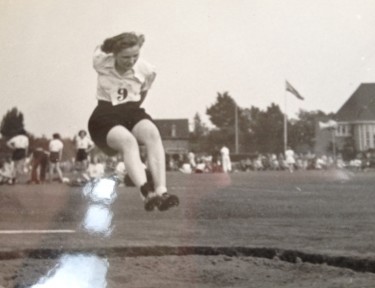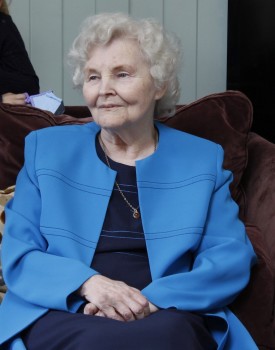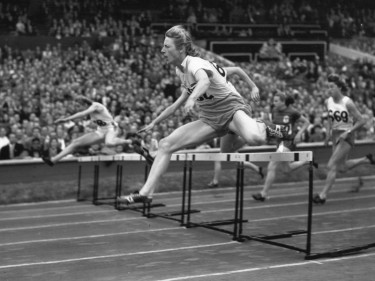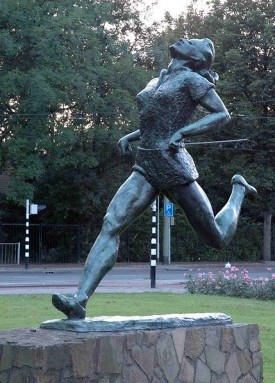'The Dreadful Woman' Who Ruined London's 1948 Olympics
‘The Dreadful Woman’ Who Ruined London’s 1948 Olympics
by Sara Morrison

This is a story — a true story — about Olympic highs and lows, triumphant wins and crushing defeats, the old and the new, and my grandmother and a horrible Dutch woman who leapt over her dreams like they were just another hurdle on her path to the gold.
The Olympic Games are coming to London this week, and with them will come crowded airports, crowded subways, crowded streets, and crowded stadiums — most built for the event and covered in corporate sponsor logos (which is better, aesthetically, than that heinous official Olympics logo or the terrifying mascot whose face is just one giant eyeball). British taxpayers will end up footing a bill of at least nine billion pounds — that’s 14 billion dollars — for all of this. They won’t get much in return. Tickets for many of the events (except soccer football) are difficult to come by, and most have been allocated to corporate sponsors or sent to other countries to sell to their citizens. Many Londoners won’t even get a chance to see the games that their taxes paid for.
It wasn’t always this way. Sixty-four years ago, in 1948, London last hosted the Olympic games, and they did it on the cheap. They had to. This was just three years after WWII, and Great Britain was still recovering from its losses. It didn’t really have the resources to stage such an event. It did it anyway. The “Austerity Games” cut costs by using existing venues rather than building new ones and putting athletes up in existing accommodations (military camps, college dorms, and youth hostels) rather than building an Olympic Village. Athletes had to bring their own food, and use buses and the subway to get to their events. Concessions were purchased using ration coupons.

But it all worked out in the end. My Nanny (yes, I call my grandmother “Nanny” okay? That’s how my family rolls) lived in London when the Olympics came to town. She loved to play sports (in high school she was so good at field hockey that she played on the boys’ teams like an absolute badass), and had even trained at some of the same facilities as the British female track and field athletes. So watching the women she’d trained with compete in the Olympics — and win, as many of them were heavily favored to do (with the USSR refusing to participate and Germany and Japan not invited because of all the trouble they’d just caused, there was that much less competition) — was very exciting.
And then a Dutch woman they called “The Flying Housewife” ruined everything.
You were 18 years old then, Nanny?
Nanny: I was 18.
And how old were you, Grandad?
Nanny: 48.
Grandad: No! Do you mind?
Nanny: 1948.
Grandad: I was 24.
Were you excited about going to the Olympics?
Nanny: We didn’t have all that hype about the Olympics, did we?
Grandad: Oh no, no. It was just the Olympics.
No Coca-Cola and McDonald’s?
Nanny: No. It was just on at Wembley. I went with four friends of mine from the Pearl Sports Club, where we got tickets. I was keen on running.
How much did tickets cost?
Nanny: Two pounds.
They’re more expensive now.
Nanny: Gosh, now they’re — well you couldn’t buy them for Bolt [She’s referring to the the men’s 100 meter dash as the “Bolt,” as she’s expecting Usain Bolt to dominate it again]. I mean, they’d be thousands. Nowadays, you apply for tickets and it doesn’t mean to say you get them. You apply for tickets for horse-riding in Greenwich Park and you get hockey.
So you don’t even get to see the events you want to see?
Nanny: No. Not the ones you want.
But in 1948, you could just buy a ticket for an event and go.
Nanny: Yes. And you got a seat. A good seat, yes. I sat with my four friends and got a good seat by the winning post.
Sounds like a fun time.
Nanny: I had a really enjoyable Olympics. The crowd was so nice. I walked up the Wembley mile. We used to call it the Mile, didn’t we? The Mile. And you all walked up, and the crowd was lovely. And then coming back, you got the Tube back to London, there were no crowds and no pushing.
You don’t think the crowd will be as lovely now?
Nanny: Oh, no, I wouldn’t go! I wouldn’t go now.
Why not?
Nanny: Gangs, yes.
Grandad: People were much more civilized in those days.
Nanny: Oh, they were.
Grandad: We just had the discipline of the war, you see … People behaved themselves during the war. You didn’t have louts hanging about the place and shouting and screaming.
Nanny: No, we didn’t. We didn’t… I don’t think my mother probably knew anything about it. My mother would’ve just thought I was doing something at the sports club. She wouldn’t have known. My dad would’ve known.
Wouldn’t he have wanted to see it?
Nanny: He didn’t get the time off, you know.
Right, Great-Grandad was a policeman. They probably had to have a lot of police and security there, searching people’s bags and things.
Nanny: They wouldn’t search your bag, no. Oh no, you weren’t searched. No.
Now they’re putting all the police on security duty to make sure it’s safe.
Nanny: Met police are having no holidays. They’re just having a rest day. We’re paying for that. Well, we are.
Even if you did want to go now, you’d have a hard time getting a ticket. They allotted so many to other countries so they’d all have a chance to see their athletes.
Nanny: You’ve got it. You’ve hit the nail on — that’s it. It’s other people buying them. It’s a lot of corporate buying. They give them to banks and all that sort of thing.
Grandad: Out of all proportion, really.
Nanny: You wouldn’t get near it now, the 100 meters — Bolt. And that’s been — well, Coe [Sebastian Coe, chairman of the London Organizing Committee for the Olympic Games] said it was being given to corporate, didn’t he? Who are paying thousands.
Grandad: Didn’t used to do it in those days.
Nanny: No.
Grandad: I mean, it was just athletics and people went to watch the athletics. They didn’t go to have a slap-up dinner and sort of get half-drunk and then sort of glance under their eyelids at what was going on.
So the people going to see the Olympics now don’t even care about sports?
Grandad: No.
Nanny: No, it’s like Wimbledon. They have a ticket free and they go and have a good meal and then go home and the seats are empty. That’s very bad.
Did a lot of people come to watch the 1948 games?
Nanny: Yes! Every seat was full, yes. We didn’t have television. If you wanted to see it, you went. You didn’t have much, you know, news people. If you wanted to see it, you went. No television in 1948.
Grandad: They used to have it on the radio, Doreen. Commentaries on radio.
Did people from other countries get to London for the 1948 Olympics?
Nanny: The people didn’t come, did they? To watch.
Grandad: I don’t know. They might have done.
Nanny: No.
Grandad: They might’ve come, Doreen.
Nanny: No.
Did they have concession stands there?
Nanny: We didn’t eat food, no. We went for the afternoon. I went from work and after dinner I went with my four friends. We went for the afternoon.

There were only four running events for women in the 1948 Olympics: the 100 meters, the 200 meters, the 4 x 100-meter relay, and the 80-meter hurdles. British women were favored to win them all. At least, Britain thought that Britain was favored to win them all. They didn’t count on a 30-year-old mother of two from the Netherlands named Fanny Blankers-Koen. Who would? Women competing after giving birth — and leaving their rightful place in the home to do so — were unheard of. And Blankers-Koen was so much older than her competition, but she had no choice: she lost her peak years to WWII. Blankers-Koen ended up qualifying for all four track events.
Nanny saw the 100-meter dash and the 80-meter hurdles. Dorothy Manley ran the 100 meters for Britain. She finished in 12.2 seconds. Blankers-Koen finished it in 11.9, winning the gold and tying an Olympic record. Manley got the silver.
This was disappointing, but Nanny still had the 80-meter hurdles to watch, seats on the finish line, and Brit Maureen Gardner was even more heavily favored to win this event than Manley was hers. Gardner ran quite a race, too — a new Olympic record of 11.2 seconds. Unfortunately, someone else also ran it in 11.2 seconds: Fanny Blankers-Koen. It was a photo finish. The crowd waited for the results.
You thought Gardner won?
Nanny: I thought she’d won. I was on the winning line and I thought she’d won. And all of a sudden “God Save the King” came up. And we all stood up and cheered, we went mad. But it was the Queen’s birthday and she’d just arrived.
You thought they were playing the national anthem for Gardner, but it was just because the Queen happened to walk into the stadium.
Nanny: And they announced that this Fanny Blankers-Koen had won.
Not British.
Nanny: She was Dutch. And we’d never heard of her. I had never heard of her. And Maureen came second.
So both of the events that you saw…
Nanny: Fanny won.
And the British women you expected to come in first got silver instead?
Yes.
Were you angry?
Nanny: Well, I was yes. We hadn’t heard about her, you know, and we didn’t know where she’d come from. And we found out that she was a 30 year old with two children. Dutch lady. Mmm. Nobody had heard about her had they, Michael?
Grandad: No.
Nanny: And we never heard of her again.
Grandad: Oh, no, she did run afterwards, Doreen.
Nanny: Well. I didn’t hear of her.

Nanny didn’t hear anything about her, but many others did. Blankers-Koen set an Olympic record in every individual event she competed in (the only event she didn’t set an Olympic record in was the relay, which is probably the other three women on her team’s faults). She won the gold medal in every event she competed in. The only reason why she didn’t also enter the high jump and the long jump, events at which she was also among the best in the world, was because the Olympics rules then limited participants to just three individual events. No female runner has matched Blankers-Koen’s accomplishment since. The Guardian recently put that 80 meter hurdle race as number 10 in its top 50 stunning Olympic moments , the International Association of Athletics Federations named her the Female Athlete of the 20th Century, and there are not one, but two statues of her in the Netherlands. One is outside the Fanny Blankers-Koen Stadium, where the annual Fanny Blankers-Koen games are held.
In the end, out of the 33 track and field events at the 1948 games, Great Britain won a gold medal in… none of them. The Netherlands, on the other hand, won four medals. Britain did win six silvers — three of them in the four events Fanny Blankers-Koen won. Basically, Fanny Blankers-Koen ruined the Olympics for everyone. Or maybe just my grandmother. Same thing.
What was it like, watching Fanny run?
Nanny: Well, the 100 meters, I mean… I was just amazed. It was a bit sad… oh, nevermind.
Why were you sad?
Nanny: Well, I expected them to win, I mean, we had such good girls.
And you had seen Maureen train, working very hard.
Nanny: They all did.
Any good American athletes?
Grandad: There always are.
Nanny: They must have sent people.
Oh yes, course they did. Why shouldn’t they?
Anything to add, Grandad?
Grandad: I saw the men’s 100 meters. And I think the 5000. Yes, I saw that.
Nanny: I wasn’t really interested in the men running long distance. I’m not now.
You’ll be watching on TV this summer. What are you looking forward to?
Nanny: I want to watch the girls’ sprints.
You’ll watch the women again?
Nanny: Yes.
Do you think they’ll win the gold this time?
Nanny: Well I’m hoping the, um — what’s her name? The girl with the seven events will win.
Jessica Ennis.
Nanny: Jessica! I shall be watching Ennis. I hope she wins.
Grandad: She’s a heptathlete, isn’t she?
Nanny: Yes.
Grandad: Seven events.
Nanny: As long as she can do the javelin. She’s not very good at the javelin.
Okay, but what if a Dutch woman comes in and —
Nanny: Oh, I shall go mad! I shall say, “Drugs! Drugs!”
Okay, so, 64 years later, another Dutch woman comes in and takes all the medals again, what do you do?
Nanny: I shall throw something at the TV. No, there is a girl who’s quite good. I’ve forgotten where she comes from. She can do the javelin. I think she’s an Eastern girl, isn’t she? [I believe Nanny is referring to Russian heptathlete Tatyana Chernova, who is very good at the javelin.] It’s a shame I didn’t save my programs, wasn’t it? I should’ve done.
The Museum of London has programs from 1948 there, under glass. They could’ve been yours!
Nanny: I know, I know. I never saved anything.
They called Fanny Blankers-Koen “The Flying Housewife” after her 1948 performance. Not Nanny. As soon as the recorder was off, she called Blankers-Koen “that dreadful woman.”
Sara Morrison is a journalist in New York City. She’s very lucky to have four amazing grandparents, none of whom are Dutch. Photo of Fanny Blankers-Koen statue by Ruud Zwart.
